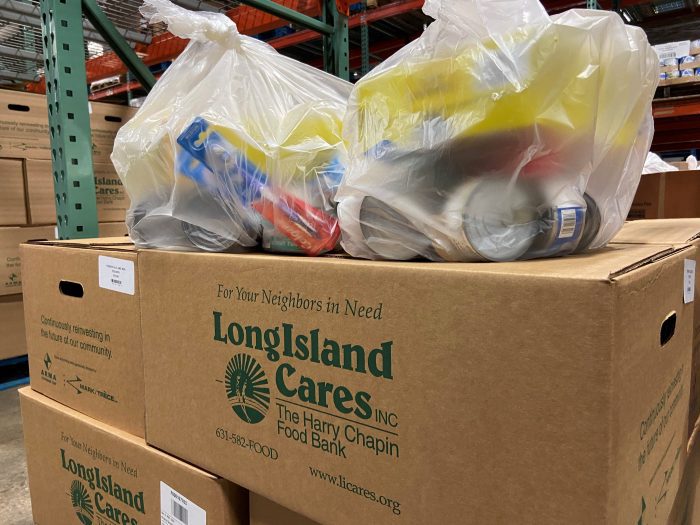Catholic Health and Long Island Cares partner to fight food insecurity

A local health care system and nonprofit have joined forces to help patients in the area.
Catholic Health and Hauppauge-based Long Island Cares food bank have been working together to help patients battling food insecurities.
“We have to engage health care partners in the fight against hunger,” said Jessica Rosati, Long Island Cares vice president for programs.
A pilot program was launched last summer in Catholic Health emergency rooms, including St. Catherine of Siena Hospital in Smithtown and St. Charles Hospital in Port Jefferson, to identify residents who need grocery supplements. The initiative includes health care practitioners screening emergency room patients for what are called “hunger vital signs.” If a screener deems a person is food needy, the patient can take a bag that has enough food for one or two people for three days.
Dr. Lawrence Eisenstein, Catholic Health vice president and chief public and community health officer, said there has been data showing that 10-15% of Long Islanders experience food insecurities.
“We don’t want people leaving our hospitals and going to a home with no food,” Eisenstein said.
The doctor said questions asked during screening include if there is enough food in the patient’s home or if they have enough money to buy more. Eisenstein said the bags are meant to be a bridge until a person can receive additional help. Health care professionals will also ask patients if they need help connecting with the Supplemental Nutrition Assistance Program, also known as SNAP, or social services.
Rosati said food insecurity is a social determinant of health.
“It makes a lot of sense for health care providers to start screening individuals for food insecurity, simply because it has such a strong correlation with other diseases and disorders,” she said. “If we can treat people when they immediately come in, then we have a better chance of linking them with the appropriate services so they have all of their needs met — not only their physical health, but everything else.”
Eisenstein added that the hope is to prevent unnecessary readmissions. He gave the example that if a patient with congestive heart failure may not be able to afford nutritious food, they may be back in the emergency room with health problems.
He said unnecessary admissions might mean financial consequences for a health care system, but ensuring people don’t return to the emergency room unnecessarily is part of a hospital’s mission “to be humane and serve the most vulnerable.”
According to Rosati, more than 1,000 meals in to-go bags were distributed at all six Catholic Health hospitals to date. She added all the food included in the bags are nonperishable, shelf stable, and staff ensure food is nutritionally sound before being purchased.
She added Catholic Health officials approached Long Island Cares about initiating the program and the health care system has taken ownership of the program and found donors to expand it. She commended Catholic Health for its efforts, adding that such an initiative is “imperative for people’s overall health and the success of their health,” and hopes other providers will take note.
Bags are now also being distributed throughout the Catholic Health’s ambulatory care, walk-in clinics, home care operations and cancer institute locations throughout Long Island, including Smithtown, Port Jefferson, Commack and East Setauket.
Uniondale-based Harris Beach law firm recently donated $5,000 to the program, according to Long Island Cares, which will cover 2,000 meals.






